PCB Repair Logs Midnight Resistance: Difference between revisions
Created page with "==Midnight Resistance== <p><table class="infobox vevent" style="width:22em;" cellspacing="5"> <caption class="summary" style=""><b>Midnight Resistance</b></caption> <tr class..." |
mNo edit summary |
||
| Line 19: | Line 19: | ||
'''Forum Thread:''' [http://www.aussiearcade.com.au/showthread.php/27221-Midnight-Resistance-Repair-Log Midnight Resistance PCB Repair]<br> | '''Forum Thread:''' [http://www.aussiearcade.com.au/showthread.php/27221-Midnight-Resistance-Repair-Log Midnight Resistance PCB Repair]<br> | ||
<br> | <br> | ||
=== Board 1 ===<br> | |||
Bought a Midnight Resistance board recently, was up with a buy-it-now very cheap so I grabbed it, I love the game, its the reason my cab has rotary sticks installed. | |||
Anyway the seller said it worked fine except there was no sound, well not quite, when powered up it was clear that the video was missing the blue signal, | |||
<br> | |||
<br> | |||
[[File:Pcb repair midnight resistance 1 1.jpg]] | |||
<br> | |||
<br> | |||
[[File:Pcb repair midnight resistance 1 2.jpg]] | |||
<br> | |||
<br> | |||
[[File:Pcb repair midnight resistance 1 3.jpg]] | |||
<br> | |||
<br> | |||
Originally thought it was my test bench jamma loom playing up as its getting very unreliable but poking the scope at the jamma edge connector showed that green and red were happily buzzing away but blue was silent. I visually followed the track back to NB1 (one of three - the other two pass the red and green) and then used the continuity meter to buzz around the nearby chips, pin 7 of a 74LS174 which was silent on the scope. | |||
<br> | |||
<br> | |||
[[File:Pcb repair midnight resistance 1 4.jpg]]<br> | |||
<br> | |||
It was a Fujitsu chip, and these are often known to die by losing internal connectivity to a pin. The simple test is to piggy back a known good chip on top of the original. If it has died by losing a pin the piggy backed chip will light up that leg, and in this case the graphics were instantly fixed. | |||
You can see the piggy backed chip circled in red. | |||
<br> | |||
<br> | |||
[[File:Pcb repair midnight resistance 1 5.jpg]]<br> | |||
<br> | |||
Piggy backing is not a guaranteed test tho, in fact in some circumstances it can result in the piggy backed chip being destroyed, but for F branded chips with missing outputs its always worth a go. In fact my piggy backer chips tend to be F brand chips I have suspected as faulty and de-soldered only to find that they are ok, will never put an F back on a board as they are so flaky, they make for good piggy backers though as I don't mind if they get zapped. | |||
Anyway - I left piggy backed chip on and moved to the sound issue only to find that the speakers would sometimes crackle and sometimes not, I also got a lot of issues with the gfx as I was moving the board around, the red channel would flicker and the screen would lose sync. Turns out the JAMMA connector needed a good polish, it didn't look too crusty but a rub with brasso removed all the instability issues. The speaker hiss was then constant and the volume pot crancked it up and down so the amp section was also fine. I did a quick ESR check on the electrolytics but they were all good. When I powered it back up again I got the gunshot sound when coining the board up. Its possible that the sound issue was just a badly oxidised jamma connector but it seemed unlikely. I could get the coin up noises, and the "erk" noises as the enemies were hit, but no music or other effects, eventually the sounds stopped totally and I could never get them back for more than a second or so after that. In fact when the dipswitch was set to attract sounds on the board emitted a long tone until powered off, it never made another noise so I assumed the sound section was crashing long before I could coin it up. When attract mode sounds were off the 1st time it tried to do anything was on coin-up so that would explain why I could get a burst of sound out of it. | |||
As the sound CPU on these boards is a surface mount chip I started off looking at the easier option of the TMM2063 - the sound RAM for the audio CPU, the address line inputs looked nice and clean but the outputs were a real mess... | |||
<br> | |||
<br> | |||
[[File:Pcb repair midnight resistance 1 6.jpg]]<br> | |||
<br> | |||
[[File:Pcb repair midnight resistance 1 7.jpg]] | |||
<br> | |||
<br>...signal voltage very unstable, no clear distinction between logic high and logic low. Usefully enough there were other TMM2063s on the board that were involved with the game execution itself so I could poke the scope at the outputs of those chips, clearly they were ok as the game was running. The outputs of the others looked nice and clean... | |||
<br> | |||
<br> | |||
[[File:Pcb repair midnight resistance 1 8.jpg]] | |||
<br> | |||
<br> | |||
...so the chief candidate was indeed the sound SRAM. | |||
Fired up the de-solder station and whipped out the 74LS174 and the TMM2063. | |||
<br> | |||
<br> | |||
[[File:Pcb repair midnight resistance 1 9.jpg]]<br> | |||
<br> | |||
The TMM2063 failed the read write test on my eprom reader so I dug out a scrap board and de-soldered a Sony CXK5864BSP-10L chip which is a pin for pin compatible chip. How do I know this? The first thing to do when trying to find a replacement is to find a RAM chip that has the same number of pins as the one you are trying to replace, then google for the data sheet and compare the description. Both chips were described as "65536 bit CMOS SRAM organised as 8,192 words by 8 bits", then double check the chip pin outs are the same. Ignoring the fact that some manufacturers label their data pins as D0-D7 and some as D1-D8, and the same for the A pins you usually find they are totally compatible, the only other concern is the speed of the chip, which is denoted by the last number of the chip name eg CXK5864BSP-10L is a 100nSec chip, -70 would be a 70 nSec, -60 as 60nSec etc etc. If you don't have a collection of scrap boards then it gets a bit harder as you have to find a vendor then google what they are selling, you can't start with the simple eyeball conclusion that if it doesn't have the same number of pins it can be compatible. | |||
I also de-soldered a Hitachi (i.e. bulletproof) 74LS174 chip and soldered it into the board, I tend to fit machined pin sockets for RAM chips if I can, firstly to save the SRAM chip from another blast of heat and secondly to future proof the board. The logic chip will probably last another 20 years, the SRAM chip is far less likely to so sockets save the PCB from another de soldering and make the board easier to repair too. | |||
Dropped in the SRAM chip and fired her up, the graphics were perfect and all sound effects were back | |||
<br> | |||
<br> | |||
[[File:Pcb repair midnight resistance 1 10.jpg]]<br> | |||
<br> | |||
<br> | |||
<br> | |||
[[File:Pcb repair midnight resistance 1 11.jpg]]<br> | |||
<br> | |||
Mmmm Midnight Resistance.... | |||
A nice quick fix this one, judging by the state of the label tied to it that says "faulty" this board has probably been borked for many many years. | |||
<br>[[PCB_Repair_Index|Back to PCB Repair Index]] | <br>[[PCB_Repair_Index|Back to PCB Repair Index]] | ||
Revision as of 12:45, 23 August 2012
Midnight Resistance
 |
|
| PCB Image | Reserved |
|---|---|
| Pin Out | Reserved |
Repairer: Womble
Forum Thread: Midnight Resistance PCB Repair
=== Board 1 ===
Bought a Midnight Resistance board recently, was up with a buy-it-now very cheap so I grabbed it, I love the game, its the reason my cab has rotary sticks installed.
Anyway the seller said it worked fine except there was no sound, well not quite, when powered up it was clear that the video was missing the blue signal,
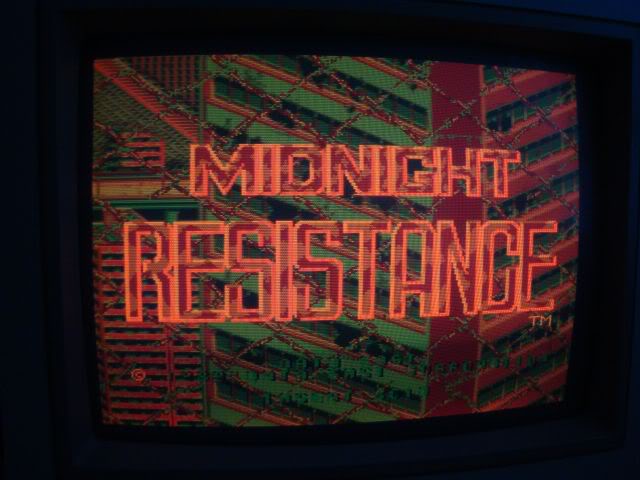
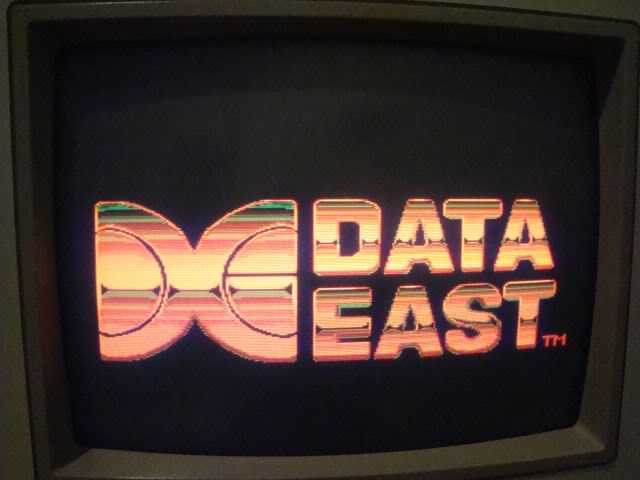
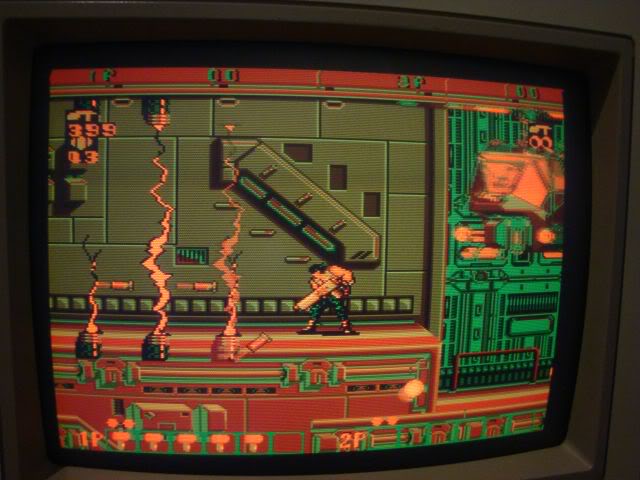
Originally thought it was my test bench jamma loom playing up as its getting very unreliable but poking the scope at the jamma edge connector showed that green and red were happily buzzing away but blue was silent. I visually followed the track back to NB1 (one of three - the other two pass the red and green) and then used the continuity meter to buzz around the nearby chips, pin 7 of a 74LS174 which was silent on the scope.
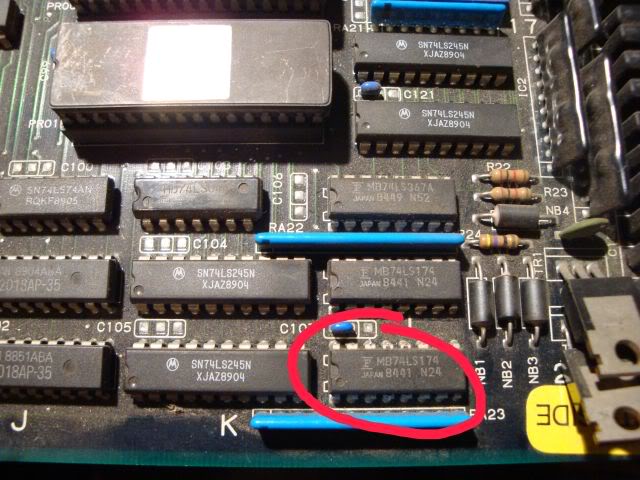
It was a Fujitsu chip, and these are often known to die by losing internal connectivity to a pin. The simple test is to piggy back a known good chip on top of the original. If it has died by losing a pin the piggy backed chip will light up that leg, and in this case the graphics were instantly fixed.
You can see the piggy backed chip circled in red.
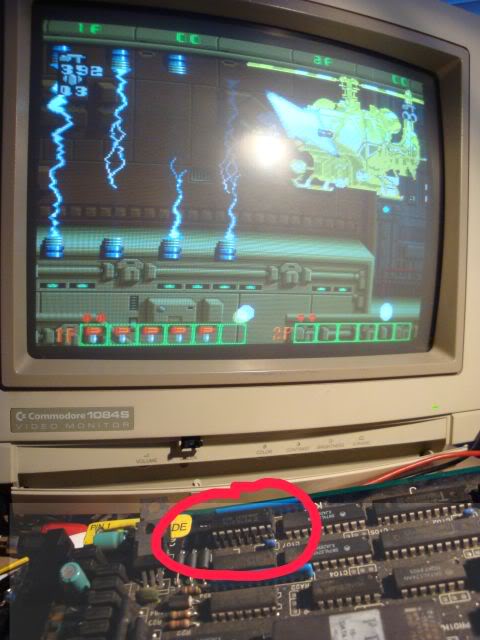
Piggy backing is not a guaranteed test tho, in fact in some circumstances it can result in the piggy backed chip being destroyed, but for F branded chips with missing outputs its always worth a go. In fact my piggy backer chips tend to be F brand chips I have suspected as faulty and de-soldered only to find that they are ok, will never put an F back on a board as they are so flaky, they make for good piggy backers though as I don't mind if they get zapped.
Anyway - I left piggy backed chip on and moved to the sound issue only to find that the speakers would sometimes crackle and sometimes not, I also got a lot of issues with the gfx as I was moving the board around, the red channel would flicker and the screen would lose sync. Turns out the JAMMA connector needed a good polish, it didn't look too crusty but a rub with brasso removed all the instability issues. The speaker hiss was then constant and the volume pot crancked it up and down so the amp section was also fine. I did a quick ESR check on the electrolytics but they were all good. When I powered it back up again I got the gunshot sound when coining the board up. Its possible that the sound issue was just a badly oxidised jamma connector but it seemed unlikely. I could get the coin up noises, and the "erk" noises as the enemies were hit, but no music or other effects, eventually the sounds stopped totally and I could never get them back for more than a second or so after that. In fact when the dipswitch was set to attract sounds on the board emitted a long tone until powered off, it never made another noise so I assumed the sound section was crashing long before I could coin it up. When attract mode sounds were off the 1st time it tried to do anything was on coin-up so that would explain why I could get a burst of sound out of it.
As the sound CPU on these boards is a surface mount chip I started off looking at the easier option of the TMM2063 - the sound RAM for the audio CPU, the address line inputs looked nice and clean but the outputs were a real mess...
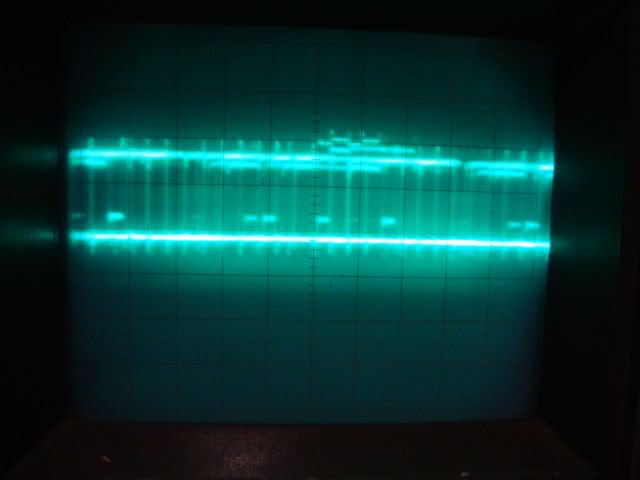
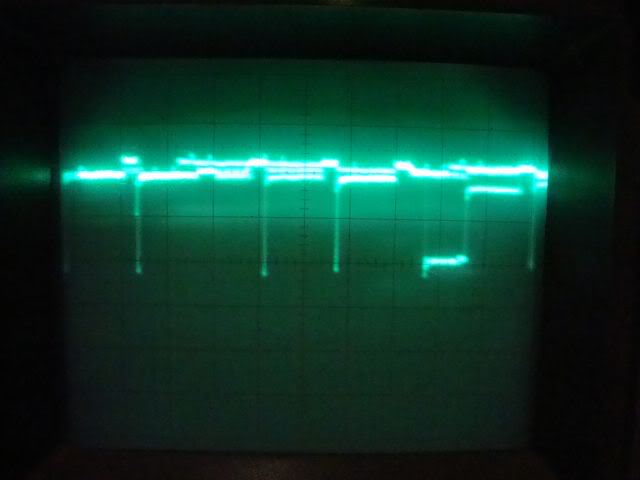
...signal voltage very unstable, no clear distinction between logic high and logic low. Usefully enough there were other TMM2063s on the board that were involved with the game execution itself so I could poke the scope at the outputs of those chips, clearly they were ok as the game was running. The outputs of the others looked nice and clean...
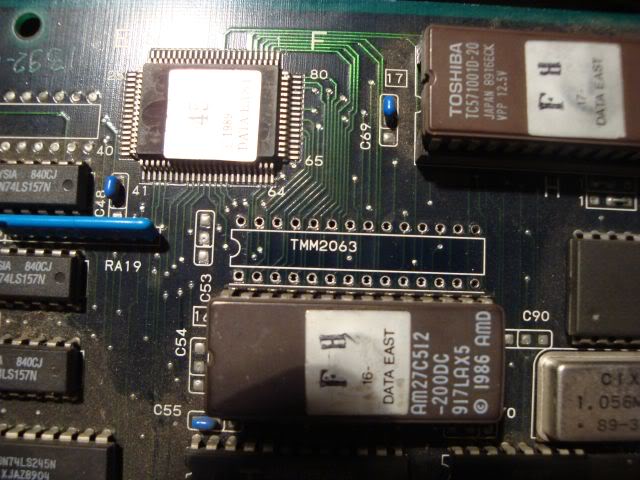
...so the chief candidate was indeed the sound SRAM.
Fired up the de-solder station and whipped out the 74LS174 and the TMM2063.
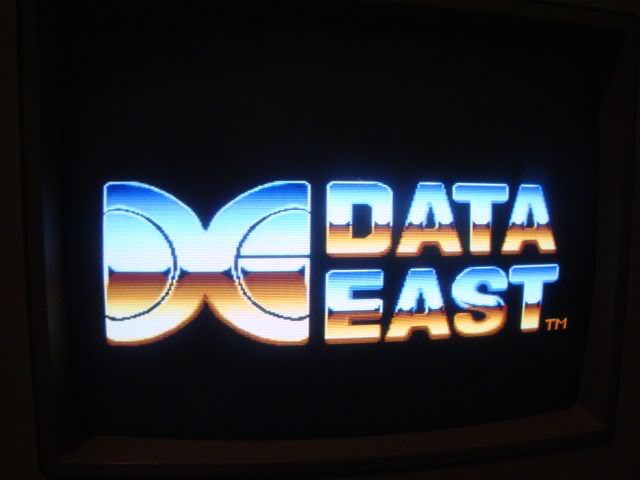
The TMM2063 failed the read write test on my eprom reader so I dug out a scrap board and de-soldered a Sony CXK5864BSP-10L chip which is a pin for pin compatible chip. How do I know this? The first thing to do when trying to find a replacement is to find a RAM chip that has the same number of pins as the one you are trying to replace, then google for the data sheet and compare the description. Both chips were described as "65536 bit CMOS SRAM organised as 8,192 words by 8 bits", then double check the chip pin outs are the same. Ignoring the fact that some manufacturers label their data pins as D0-D7 and some as D1-D8, and the same for the A pins you usually find they are totally compatible, the only other concern is the speed of the chip, which is denoted by the last number of the chip name eg CXK5864BSP-10L is a 100nSec chip, -70 would be a 70 nSec, -60 as 60nSec etc etc. If you don't have a collection of scrap boards then it gets a bit harder as you have to find a vendor then google what they are selling, you can't start with the simple eyeball conclusion that if it doesn't have the same number of pins it can be compatible.
I also de-soldered a Hitachi (i.e. bulletproof) 74LS174 chip and soldered it into the board, I tend to fit machined pin sockets for RAM chips if I can, firstly to save the SRAM chip from another blast of heat and secondly to future proof the board. The logic chip will probably last another 20 years, the SRAM chip is far less likely to so sockets save the PCB from another de soldering and make the board easier to repair too.
Dropped in the SRAM chip and fired her up, the graphics were perfect and all sound effects were back
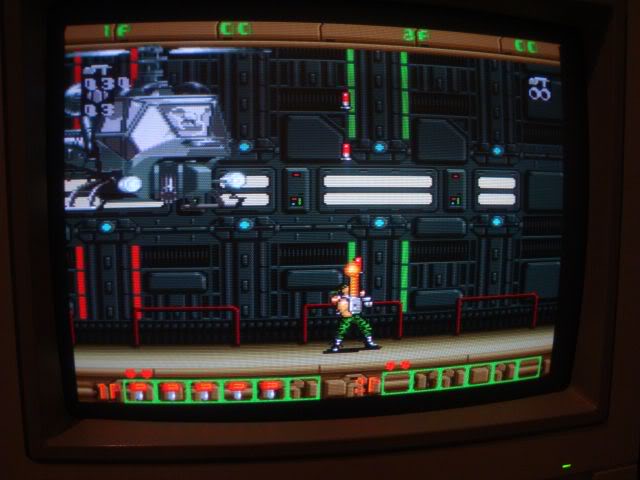
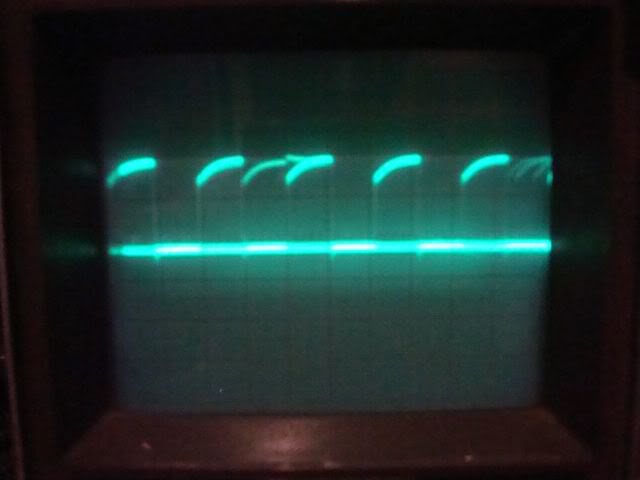
Mmmm Midnight Resistance....
A nice quick fix this one, judging by the state of the label tied to it that says "faulty" this board has probably been borked for many many years.